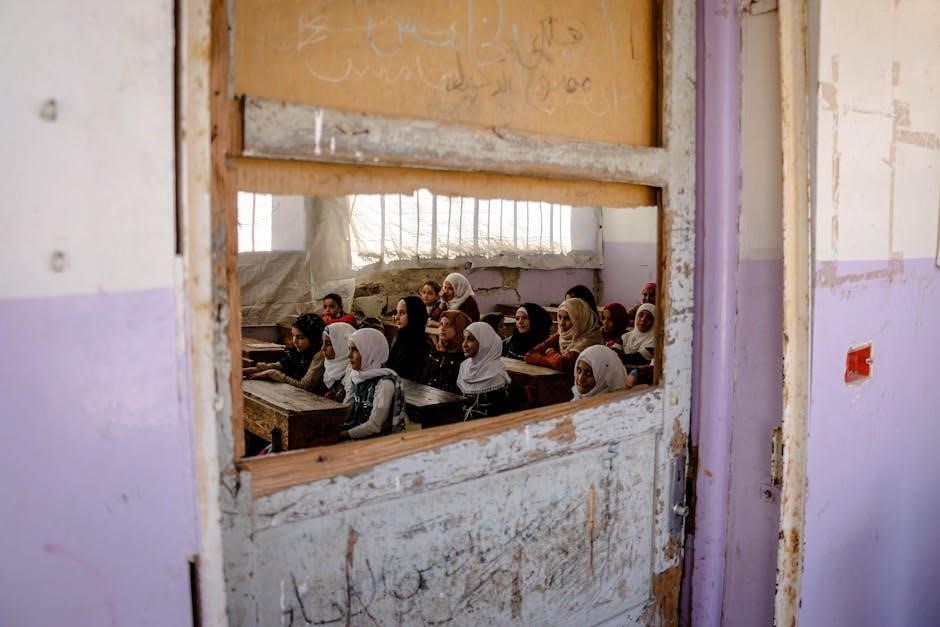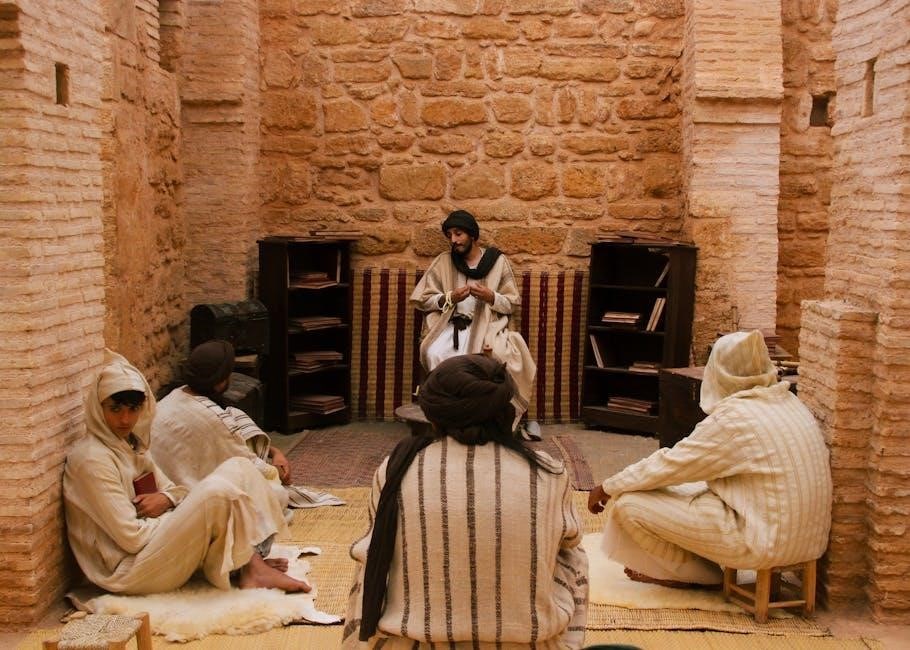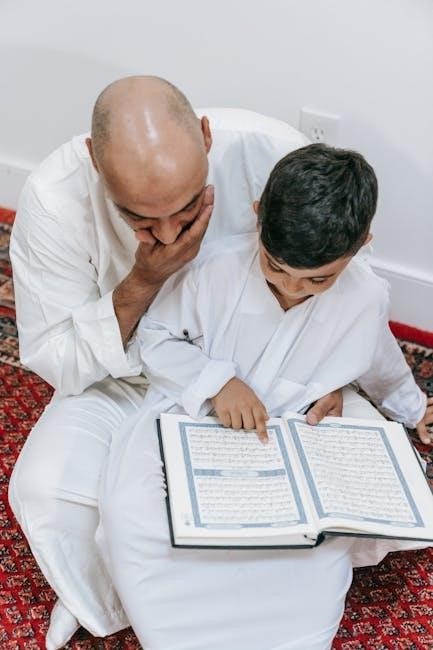Learning Arabic in India is gaining popularity due to its cultural‚ historical‚ and educational significance. With numerous books and PDF guides available‚ learners can easily access resources tailored to Indian contexts.
Importance of Arabic Language in India
The Arabic language holds significant cultural‚ historical‚ and educational value in India. It bridges communities‚ enhances understanding of Islamic heritage‚ and provides access to rich literary traditions. Arabic’s influence is evident in India’s linguistic diversity‚ with many Urdu and Hindi words rooted in Arabic. Moreover‚ it serves as a key tool for academic and religious studies‚ particularly in Islamic scholarship. Learning Arabic in India fosters intellectual growth and cultural appreciation‚ making it a valuable skill in both personal and professional spheres.
Historical Significance of Arabic in India
Arabic has a profound historical presence in India‚ dating back to the medieval period when Arab traders and scholars arrived. The language influenced Indian culture‚ particularly through Islamic rule and the spread of Sufism. Arabic script was adapted for Urdu‚ and many Arabic words integrated into local languages. India’s scholars contributed significantly to Arabic literature and Islamic studies‚ fostering a rich intellectual legacy. This historical connection underscores the enduring relevance of Arabic in India’s cultural and educational landscape‚ making its study a bridge to the past and a pathway to the future.

Current Demand for Arabic Learning in India
Arabic learning in India is increasingly sought after for cultural‚ educational‚ and career opportunities. Its historical ties and modern relevance drive this growing demand across diverse communities.
Reasons for Learning Arabic in India
Learning Arabic in India is driven by diverse motivations‚ including cultural enrichment‚ religious studies‚ and career opportunities. Many books and PDF guides cater to Indian learners‚ offering structured courses that blend grammar‚ vocabulary‚ and practical communication. Arabic’s historical significance in India‚ particularly in Islamic studies and academia‚ further fuels its popularity. Additionally‚ the growing demand for Arabic professionals in fields like diplomacy‚ translation‚ and international business makes it a valuable skill. The availability of tailored resources ensures that learners can progress effectively‚ whether for personal growth or professional advancement.
Applications of Arabic Language Skills in India
Arabic language skills in India open doors to diverse applications‚ particularly in academia‚ diplomacy‚ and cultural exchange. Professionals with Arabic proficiency are in demand for roles such as translators‚ interpreters‚ and researchers. The language is invaluable for accessing historical texts and conducting Islamic studies. Additionally‚ Arabic skills enhance career opportunities in industries like international trade‚ tourism‚ and media‚ especially with Middle Eastern countries. These skills also foster cultural understanding‚ bridging gaps between Indian and Arabic-speaking communities‚ and play a significant role in fostering global collaboration and exchange.
Resources for Learning Arabic in India
India offers books‚ PDF guides‚ top institutions‚ and online platforms for Arabic learning‚ providing comprehensive resources for mastering the language.
Recommended Books and PDF Guides
Several books and PDF guides are available for learning Arabic in India‚ such as “Arabic: An Essential Grammar” and “Practical Guide to Learning Arabic”. These resources provide structured lessons‚ vocabulary‚ and cultural insights. Indian scholars have also authored books like “Handbook for Learn Arabic Language” and “New Arabic Words” by Abu Dhabi Indian School. Additionally‚ PDF crash courses and free downloadable guides are popular for beginners‚ offering concise and effective learning pathways tailored to Indian learners.
Top Institutions Offering Arabic Courses in India
India boasts several renowned institutions offering Arabic courses‚ such as Jawaharlal Nehru University (JNU) in Delhi‚ known for its comprehensive Arabic programs. Aligarh Muslim University (AMU) is another prominent center‚ providing diploma and degree courses in Arabic. Additionally‚ Mumbai University and Jamia Millia Islamia offer specialized Arabic programs‚ focusing on language proficiency and cultural insights. These institutions cater to diverse learning needs‚ ensuring a strong foundation in Arabic for students across India.
Online Platforms and Tools for Arabic Learning
Online platforms like Duolingo‚ Babbel‚ and Rosetta Stone offer structured Arabic courses with interactive lessons. Arabicpod101 provides audio and video resources for all skill levels. Khan Academy and YouTube channels like “Learn Arabic with Maha” offer free tutorials. Additionally‚ websites like LearnArabicOnline.com provide PDF guides and crash courses for quick learning. These tools cater to diverse learning styles‚ making Arabic accessible to learners in India and beyond‚ ensuring a comprehensive and flexible learning experience.
A Beginner’s Guide to Arabic Language
A comprehensive guide for beginners‚ offering insights into the Arabic language‚ its alphabet‚ and dialects. Ideal for learners in India‚ it includes PDF resources for easy understanding.
Basic Steps to Start Learning Arabic
Begin by understanding the significance of Arabic in India‚ then gradually learn the Arabic alphabet and basic pronunciation. Utilize PDF guides and books designed for Indian learners‚ focusing on structured lessons. Enroll in courses offered by institutions or online platforms to gain a solid foundation. Practice daily with simple phrases and engage in language exchange communities. Immerse yourself in Arabic media and cultural resources to enhance comprehension. Consistent effort and dedication are key to mastering the language effectively in India.
Understanding Arabic Alphabet and Dialects
The Arabic alphabet consists of 28 letters‚ written from right to left‚ and is essential for learning the language. Each letter has distinct shapes and sounds‚ with some letters changing form depending on their position in a word. Dialects vary across regions‚ with Modern Standard Arabic being the formal version used in writing and official contexts; In India‚ learners often focus on dialects like Gulf or Levantine Arabic due to cultural and professional ties. Mastery of the alphabet and dialects is crucial for effective communication and understanding Arabic texts‚ as emphasized in many Indian PDF guides.
Crash Course for Quick Learning
Crash Course for Quick Learning
A crash course for learning Arabic in India focuses on rapid acquisition of essential skills through structured‚ accelerated programs. Many PDF guides and online resources offer concise lessons‚ enabling learners to grasp basic phrases‚ vocabulary‚ and grammar quickly. These courses often include interactive exercises‚ audio aids‚ and cultural insights‚ making them ideal for beginners with time constraints. Platforms like LearnArabicOnline.com provide crash courses tailored to Indian learners‚ emphasizing practical communication skills for travel‚ work‚ or academic purposes. This approach ensures quick proficiency‚ making Arabic accessible even for those with busy schedules.

Cultural Aspects of Arabic Language in India
Arabic language learning in India is deeply intertwined with cultural and religious practices‚ particularly in Islamic education and liturgy‚ enriching India’s diverse linguistic heritage and community life.
Role of Arabic in Indian Culture and Education
Arabic plays a significant role in Indian culture and education‚ particularly in Islamic studies and liturgical practices. It is widely taught in madrasas and universities‚ fostering cultural enrichment and religious understanding. Arabic’s influence is evident in Indian literature‚ art‚ and historical documents‚ contributing to the country’s linguistic diversity. Many scholars emphasize its importance in preserving Islamic heritage and promoting cross-cultural exchange. Additionally‚ Arabic education in India is seen as a bridge between tradition and modernity‚ enriching the nation’s multicultural identity and intellectual legacy.
Arabic Language and Islamic Studies in India
Arabic is deeply intertwined with Islamic studies in India‚ serving as the liturgical language of the Quran and Hadith. It is widely taught in madrasas and Islamic institutions‚ enabling students to interpret religious texts accurately. The language holds immense religious and cultural value‚ fostering a connection to Islamic heritage. Many Indian scholars emphasize the importance of mastering Arabic for a deeper understanding of Islamic theology and jurisprudence. This linguistic pursuit not only enriches religious knowledge but also promotes academic and cultural exchange within the Muslim community in India.
Practical Applications of Arabic in India
Arabic skills are valuable in India for understanding Islamic texts‚ fostering cultural exchange‚ and advancing academic research.
It also enhances career opportunities in fields like diplomacy‚ translation‚ and education‚ bridging cultural and professional gaps.
Arabic for Career Opportunities in India
Proficiency in Arabic opens doors to diverse career opportunities in India‚ particularly in fields like translation‚ diplomacy‚ education‚ and research.
Industries such as MNCs‚ NGOs‚ and cultural organizations value Arabic-speaking professionals for roles in international relations and cross-cultural communication.
Moreover‚ Arabic skills are highly sought after in Islamic studies‚ media‚ and academia‚ offering a competitive edge in the job market.
With increasing global connections‚ the demand for Arabic experts in India is growing‚ making it a valuable skill for career advancement.
Using Arabic for Research and Academia in India
Arabic is invaluable for research and academia in India‚ particularly in Islamic studies‚ history‚ and cultural analysis. Scholars rely on Arabic texts to access original Islamic scriptures‚ historical documents‚ and literary works.
Indian researchers benefit from Arabic to explore the contributions of Arab scholars in fields like science‚ philosophy‚ and medicine.
Academic institutions in India offer Arabic courses to equip students with the language skills needed for advanced research and interdisciplinary studies.
This expertise fosters deeper understanding of India’s historical and cultural ties with Arab nations‚ enriching academic discourse.

Challenges in Learning Arabic in India
Learning Arabic in India faces challenges like limited qualified instructors‚ scarce resources‚ and dialect variations. The script’s complexity and lack of exposure hinder progress for many learners.
Common Difficulties Faced by Learners
Learners of Arabic in India often face challenges such as mastering the complex script‚ understanding dialect variations‚ and accessing quality resources. The lack of qualified instructors and exposure to native speakers further complicates the process. Additionally‚ the grammatical structure and pronunciation differences from Indian languages can be daunting. Motivation and consistent practice are essential to overcome these hurdles and achieve proficiency in Arabic.
Overcoming Challenges with Effective Resources
Learners in India can overcome challenges by utilizing Arabic learning PDF guides and structured books designed for Indian audiences. These resources often include crash courses‚ vocabulary lists‚ and practical exercises tailored to local needs. Online platforms like LearnArabicOnline.com also provide supplementary materials‚ such as audio apps and visual lessons‚ to enhance learning. Additionally‚ institutions offering Arabic courses ensure learners receive guided support‚ making the journey more manageable and effective. These tools help bridge gaps and facilitate steady progress in mastering the language.

Success Stories of Arabic Learners in India
Indian scholars have excelled in mastering Arabic‚ contributing to its educational and cultural growth. Their journeys inspire others to embrace the language’s richness and opportunities.
Inspirational Journeys of Indian Arabic Scholars
Indian Arabic scholars have made remarkable contributions to the language’s growth in India. Their dedication to mastering Arabic has inspired countless learners; Many scholars have authored books and PDF guides to simplify Arabic learning‚ blending Indian and Middle Eastern cultural insights. Their work highlights the language’s relevance in education‚ religion‚ and cultural exchange. These scholars’ journeys showcase how Arabic proficiency can open doors to deeper understanding and opportunities. Their achievements serve as motivation for aspiring learners to embrace the richness of the Arabic language.
Benefits of Mastering Arabic Language in India
Mastering Arabic in India offers numerous benefits‚ including enhanced career opportunities in diplomacy‚ education‚ and international relations. It deepens cultural understanding and bridges gaps between Indian and Middle Eastern societies. Arabic proficiency also facilitates access to Islamic studies and literature‚ enriching religious and academic pursuits. Additionally‚ it opens doors to global opportunities‚ as Arabic is a widely recognized language in international organizations. Learners gain a competitive edge in diverse fields‚ making it a valuable skill in today’s interconnected world.
Learning Arabic in India is a valuable pursuit‚ offering cultural enrichment‚ educational opportunities‚ and access to a wealth of resources like PDF guides and dedicated books.
Future Prospects of Arabic Language in India
The future of Arabic language learning in India looks promising‚ with growing demand for cultural and educational exchange. Increased accessibility to PDF guides and books tailored for Indian learners ensures widespread adoption. As global ties with Arab nations strengthen‚ proficiency in Arabic will open doors in diplomacy‚ trade‚ and academia. The integration of Arabic studies in Indian education highlights its significance‚ making it a valuable skill for future generations seeking opportunities in diverse fields.
